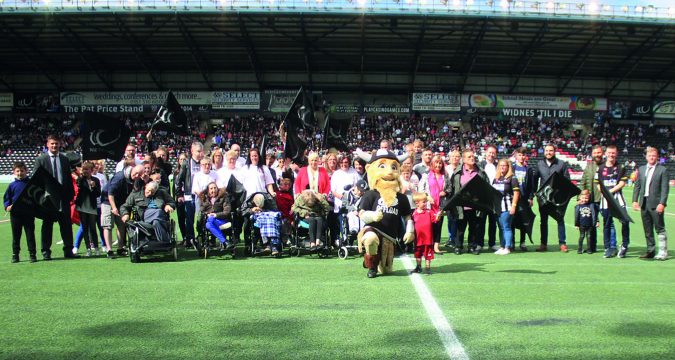
Evolution is a word thrown about a lot in sport these days.
But for sporting organisations across the world, that includes growth on and off the pitch, and two clubs that have made great strides away from the field are Widnes and St Helens, who have worked in harmony to make an astronomical impact on people within their local communities who need their support.
Rugby League World spent a day checking out the work the two clubs do alongside Community Integrated Care, a social care charity that works around the UK providing support within local communities and is the driving force behind the recently established Learning Disability Super League.
A whistle-stop tour starts at Glenwood Care Home, where Widnes players Hep Cahill and Olly Ashall-Bott have arrived to talk to some of the local residents.
“It’s something I really enjoy doing,” Cahill says.
“When you get a smile out of them, it makes your day. I think it’s a really important thing to do, not only for Widnes as a club but just for people to do for their local communities.”
The home has several Vikings supporters as residents, with several of them wearing Widnes attire during the visit.
“It’s great to see,” Ashall-Bott says.
“It shows how important the club is to the community and I think it’s great that we show how much we value them.”
Many of the residents regularly attend Widnes games as part of their routine, with carers taking them to games at the Select Security Stadium.
Widnes’ home ground is our next location for the Reminiscence Cafe.
It’s here that many elderly members of the community convene on a weekly basis. Upon arrival, old memorabilia and magazines are available for them to read, while there are several physical activities such as bowls, and a rugby ball to throw around.
There to help out is Sam Walters, who recently joined Leeds.
“Basically the opportunity came to me from the coaching staff,” he said.
“I think it’s good for us as well, it increases our public profile and we can help tell people what we’re all about. It’s important to get people from an older generation involved as well and making them feel a part of it.

“It’s important for our fanbase really, to show we’re committed to the fans and we want to give something back to them off the pitch too and in the wider community.
“The backbone will always be the fans and we need to support them through the good times and bad.”
The event is aided by several volunteers who work alongside the Vikings, known as the Golden Generation.
The concept is for supporters aged 55 and over, who get together every week to discuss their memories of the club. They are regularly joined by players past and present among other special guests.
Denis Thomas is one of those who attend the gatherings.
“We get involved however we can,” he said.
“I retired four years ago and then this came on the scene. We used to visit some homes in Widnes, reminiscing about things. That’s where we started, talking about Widnes, but some wanted to get involved but didn’t know rugby. I just love being a part of the setup.
“We don’t so much have responsibilities, we come along and mingle. I still go to one of the local homes. I don’t have to do it, I want to do it.
“People recognise the good it is doing for their residents and they want to get involved. It’s surprising how many people have come down here and met up with people they knew years ago. You can’t put a price on that. It’s triggering memories and response. It’s wonderful to see things happen like that in that way.”
From Widnes’ home, we make the eight-mile journey to the Totally Wicked Stadium.
It’s there where Saints are hosting a specialist Autism day service, which focuses on the care and development of those who attend. The concept is only in its infancy, having been set up a year ago, but they already have plans to make the service available for more people on a regular basis.
“It’s for people on the Autistic spectrum who would have not had a service in St Helens,” explains Renata Davies.
“For some it’s because they have very complex needs. There are others who are very sensory and environmentally impacted. For others, it’s because they wouldn’t attend an ordinary day service, but they don’t have the confidence to go out and about. Putting a day service into sports stadiums meant young men aren’t embarrassed to say they’re going to the stadium.
“They come in and we help them build on their social skills. We work with individuals, helping them get into employment situations and providing enough support so they can be as independent as possible, if not fully independent. We normally have six people access it one-to-one or two-to-one. We have another four on the waiting list. We only introduced it in October last year so we plan to add people ever so slightly.
“We use this as a base but go swimming and various other places. Saints are really accommodating. There wasn’t an adult changing facility in St Helens but there is now, as the club has installed one in the stadium.”
Gaz Foster has a heavy involvement in the project, and he believes the work needs to spread not only across the game, but the country.
“I think it’s just of massive importance for the community,” he said.
“To see the smiles on faces is why you do that job. The people get a lot out of it so it is imperative we keep going and making the partnership bigger. I always think giving back to the community is massive to what you do. I think with people with complex issues it’s about building confidence rather than skill, the big thing that comes out with it is the camaraderie you build.
“I think it needs to expand game wide and countrywide as people are in these situations that need a lot of help. It’s not just money, it’s about health and well-being. It gives them friendship, that’s a massive thing of what we do.”

